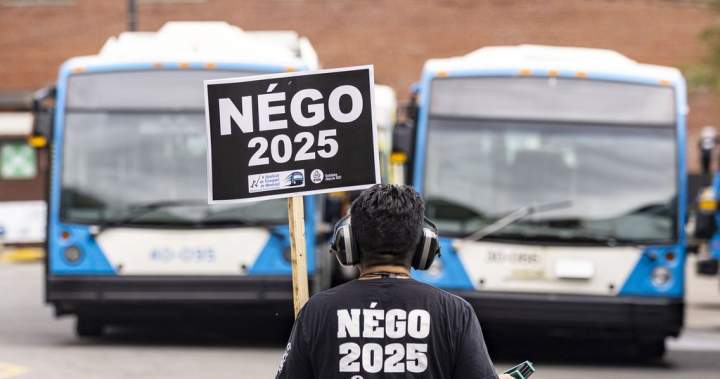A strike that is upending public transit in Montreal could be the first test of a new law that gives the Quebec government broad power to end labour disputes.
The Montreal transit agency’s 2,400 maintenance workers launched a strike last week that could last for most of November. The work stoppage — the third so far this year — has limited bus and subway service in the city to peak hours.
Political leaders are urging the two sides to resolve a dispute that has dragged on for months. But the workers union is accusing the transit agency of waiting out the clock until a new labour law, adopted in the spring, takes effect at the end of November.
The law gives Quebec’s labour minister the power to end a dispute by imposing binding arbitration when a strike or lockout is deemed harmful to the public. It also expands the kinds of services that must be maintained during a labour dispute to include those that ensure “the well-being of the population.”
“In other words, clearly, from now on, employers will no longer be under pressure to settle,” said Bertrand Guibord, an official with the union representing the transit workers, during a press conference on Monday.
“They will sit on their hands and wait for the situation to become chaotic or unmanageable before the ministry intervenes and puts an end to the work stoppage.”
Barry Eidlin, an associate professor of sociology at McGill University and an expert on labour movements, said the Quebec law is “an existential threat to unions.” He said it bears some similarity to a section of the Canada Labour Code that has been used repeatedly by the federal government in the last year to end strikes at ports, railway companies and Canada Post.

Get breaking National news
For news impacting Canada and around the world, sign up for breaking news alerts delivered directly to you when they happen.
Both laws give ministers “tremendous discretion” to intervene in labour disputes without “a lot of checks and balances in place,” he said.
The Montreal transit agency says the new Quebec law will not affect its position at the bargaining table. It has said the workers’ salary demands far exceed its ability to pay.
But Eidlin said employers will understand that the new law offers a kind of “escape hatch” that “reduces the incentive to actually come to an agreement at the bargaining table.” He said the union likely announced the month-long strike — from Oct. 31 to Nov. 28 — to put as much pressure as possible on the transit agency to reach a deal before the law takes effect on Nov. 30.
“There’s only so long that this kind of disruption can drag on before they just have to act,” he said.
However, Michelle Llambías Meunier, president and CEO of the Quebec employers council, said Montrealers are “being held hostage” by the strike, which is preventing many people from getting to work. The council is calling on the provincial government to implement the law earlier than planned if the two sides don’t reach an agreement soon.
Llambías Meunier said the purpose of the law is not to limit the ability to strike. “The idea here is that we are seeking to reconcile respect for workers’ rights with the continuity of services that are critical to the population and the Quebec economy,” she said.
In a statement on Monday, Quebec Labour Minister Jean Boulet said the dispute must be resolved as quickly as possible. “This strike is once again causing serious harm to people who depend on public transit,” he said. “I remain extremely concerned about the progress of the negotiation process.”
The maintenance workers have already gone on strike twice this year, for nine days in June and 14 days in September and October. The major sticking points in the talks are wage increases and the outsourcing of some maintenance work.
Eidlin said Boulet would likely argue that the transit workers provide “services ensuring the well-being of the population.” But the law does not define which services fall under that definition, and the list could be “pretty infinite,” he said.
“The reason that strikes are effective, the reason they create pressure to compel employers to come to the table, is because they are disruptive to the day-to-day status quo,” he said.
In August, four McGill University faculty associations filed a court challenge of the new labour law, arguing it violates the constitutional right to strike. The union representing the maintenance workers has also promised to challenge the law once it takes effect.
The federal government’s use of Section 107 of the Canada Labour Code to end work stoppages is also facing legal challenges.
Eidlin said it’s likely the matter will end up at the Supreme Court of Canada, which in 2015 recognized that the right to strike is constitutionally protected.
© 2025 The Canadian Press
Montreal transit strike could be first test of new Quebec labour law





